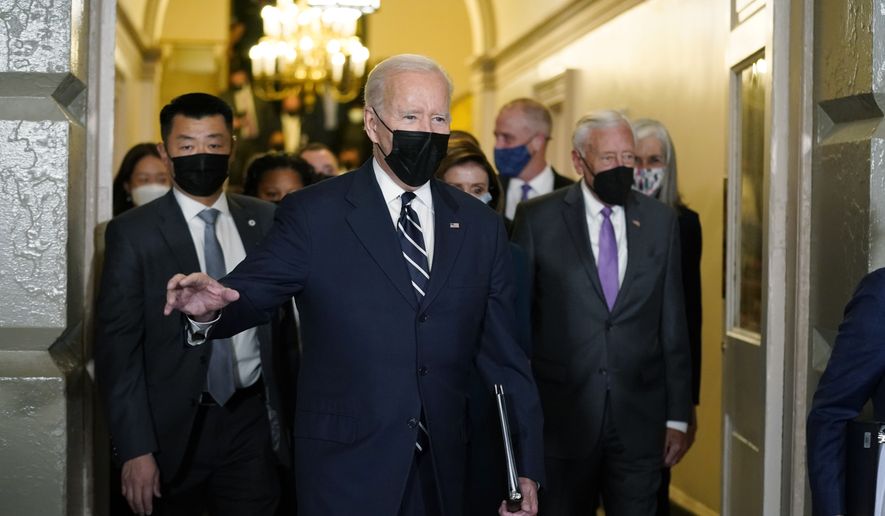President Biden on Thursday was on Capitol Hill trying to sell his latest framework for a rapidly shrinking social welfare and climate bill to starkly divided Democratic lawmakers.
The president implored Democrats to rally behind his now $1.75 trillion plan — the bulk of his legislative agenda — before he jets to Europe for high-level meetings, including a climate change summit with world leaders that begins Sunday.
The framework was more of a political talking point for Mr. Biden’s trip than an advance toward a final deal that has alluded him for months.
The framework is the latest slimmed-down version of his once $3.5 trillion agenda. It is still a work in progress with several major sticking points to be worked out by House and Senate Democrats.
The White House said Mr. Biden would defer to House Speaker Nancy Pelosi for the timing of votes on a separate $1.2 trillion bipartisan infrastructure deal and the $1.75 trillion social welfare and climate package.
“He will be full-throated that he believes each of these bills should pass when they come up,” a senior administration official said in describing Mr. Biden’s plan to sell the big bill.
SEE ALSO: Biden drops expanding Medicare to cover dental, vision from budget bill
Mr. Biden is expected to appeal directly to his party’s far-left faction, including the Congressional Progressive Caucus. Not only will the president urge compromise on the reconciliation package, but he’s expected to press for a timely vote on the infrastructure deal.
Mrs. Pelosi wants a vote on the infrastructure bill by the end of the week to secure its passage before federal funding for roads and highways runs out at the end of this month.
Progressives have blocked the infrastructure bill until they get a deal on the social welfare and climate spending. That hasn’t changed.
The final deal on the larger bill still must satisfy holdout moderate Democrat Sens. Joe Manchin III of West Virginia and Kyrsten Sinema of Arizona, as well as progressives in the House and Senate.
Mr. Biden slightly delayed his departure for Europe to make the pitch to his Democrats.
The sprawling plan includes an extension of the child tax credit that was expanded earlier this year. On climate, there are tax credits for clean energy production and the use of electric vehicles.
SEE ALSO: Biden boots paid family leave from $2 trillion social welfare bill
The framework includes universal preschool for 3- and 4-year-olds, expands the child tax credit for households earning $150,000 per year and bolsters Medicaid.
It will also include more than $550 billion in initiatives to combat climate change, including a 10-year tax credit for clean energy and a $105 billion investment to combat extreme weather.
The broader spending framework will cost about $1.75 trillion, a much slimmer package than the $3.5 trillion proposal he unveiled earlier this year.
Under the framework, the spending will be funded by a 15% minimum tax imposed on large corporations and a 1% surcharge on corporate stock buybacks. It will also impose penalties on businesses that ship jobs overseas.
There will also be a surtax on multimillionaires and billionaires, though the details of that provision were not spelled out.
“It is entirely paid for by rewarding work, not wealth, and ensuring the super-wealthy pay their fair share and can’t cheat every honest American on their tax bills,” a senior administration official said.
On Capitol Hill, the president is expected to stress the need for Democratic unity in getting his legislation across the finish line. After his White House speech, he will set off on an extended overseas trip that begins in Rome for a visit with Pope Francis.
House progressives demanded that they see more than a framework agreement on Mr. Biden’s social spending bill before moving forward with the infrastructure bill. It is unclear if progressives will be on board with the new framework. On a conference call with reporters, a senior White House official expressed confidence all Democrats could get behind the bill.
But if progressive Democrats don’t accept what he lays out, it could sink the entire package. There are more than 55 House progressives who’ve opposed the infrastructure bill right now, arguing that the larger spending bill should be passed first instead of the narrower, bipartisan deal.
• Haris Alic contributed to this report.
• Tom Howell Jr. can be reached at thowell@washingtontimes.com.
• Jeff Mordock can be reached at jmordock@washingtontimes.com.




Please read our comment policy before commenting.